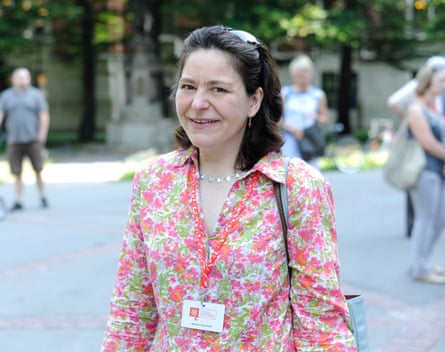Alison Anderson
For me the outstanding woman translator of all time has to be Constance Garnett, who did all the great Russians back at the end of the 19th and beginning of the 20th century. She even met Leo Tolstoy at his home. She may have her detractors, and perhaps much of her work has been retranslated, but I think many readers are not even aware of the huge cultural debt we owe her for bringing the riches of Russian literature to the west.
And for a living translator I would nominate Susan Bernofsky, who translates from German. I was stunned by the beauty of her translation of Jenny Erpenbeck’s Visitation even over and above the novel itself – which is superb. They both went on to win the Independent foreign fiction prize in 2015 for The End of Days, much deserved.
Alison Anderson has recently translated Madame Bovary of the Suburbs by Sophie Divry (MacLehose).
Susan Bernofsky
I first read Margaret Jull Costa as the translator of José Saramago, and then fell doubly in love with her when I started to read the translations of the great 19th-century Portuguese writer Eça de Queirós including his masterpiece The Maias, an incredible family saga written in the lushest, richest prose. Jull Costa has such a finely attuned ear for the rhythms of the writing of a certain era, you get all the elegance, lyricism and gravitas without a trace of the stuffiness that can so easily creep into translations. And her Saramago is masterful in a completely different mode, a much more contemporary sort of writing. I’m excited right now because she’s just done a new translation of Fernando Pessoa’s The Book of Disquiet, based on a much fuller selection of Pessoa’s fragmentary texts than was previously available.
Susan Bernofsky’s most recent translation is Memoir of a Polar Bear by Yoko Tawada (Norton).
Sarah Death
My colleague Barbara J Haveland, a Scottish-born translator of Norwegian and Danish has great experience and sensitivity. I particularly admire her translations of the novels by Norway’s Linn Ullmann, daughter of Liv Ullmann and Ingmar Bergman. Having translated one of Ullmann’s novels myself, I know what a challenge they can be.
Sarah Death’s latest translation is Astrid Lindgren’s wartime diaries, A World Gone Mad (Pushkin).
Katy Derbyshire
Christina MacSweeney’s translation of Valeria Luiselli’s The Story of My Teeth is as joyful and effervescent as the book itself, which is about a legendary auctioneer who sells off his own teeth, among other things. But what really marks it out is MacSweeney’s Chronologic, a chapter that she added to help non-Mexican readers understand the book. It’s just as funny as the novel and a really innovative approach to the translator’s work of bridging cultural gaps.
Katy Derbyshire has recently translated Christa Wolf’s One Day a Year (Seagull).
Maureen Freely
I choose Antonia Lloyd-Jones, not just because of the wonderful fluidity of her prose but because it was through her translations (always so well chosen) that I came to understand what a rich literature Poland has. The first of Lloyd-Jones’ translations that came my way was Mercedes-Benz by Pawel Huelle. It was the book I chose for Radio 4’s A Good Read about a year later. Antonia was just back in England after a long spell away. She was just leaving her flat, having left Radio 4 on to fool any thieves, when she heard someone on the radio mentioning her name. At first she thought she was imagining things! She wrote me a postcard, and soon we were friends.
Maureen Freely has recently translated Sabahattin Ali’s Madonna in a Fur Coat with Alexander Dawe (Penguin).

Margaret Jull Costa
Sophia de Mello Breyner Andresen is probably Portugal’s best-known poet after Pessoa. She wrote poetry, short stories and children’s fiction, and her poetry has been translated variously by Ruth Fainlight, Richard Zenith and, more recently (in a co-translation) by Colin Rorrison and myself. She was a staunch opponent of the Salazar regime, but while some of her poetry is political, her main focus is on childhood and youth, her own deep connection with nature, and, above all, the sea. The Brazilian novelist and short story writer Clarice Lispector was another complete original. She, too, has been translated by various translators, but I would start with her first novel, written when she was just 23: Near to the Wild Heart (New Directions, 2012), translated by Alison Entrekin, brilliantly captures the helter-skelter thoughts of its rather amoral protagonist, Joana.
Margaret Jull Costa’s translation of Javier Marías’s Between Eternities will be published in November.
Deborah Smith
Sophie Lewis is one of the finest translators currently working from French, and specialises in writing by women – complex, innovative marriages of ideas, style and form, frequently offset by the sensual and sexual experience of moving through the world as a woman. Her most recent translation is Blue Self-Portrait by Noémi Lefebvre, its stream of consciousness narrative retaining, in her English, the delicate beauty and intricate patterning of fine lacework. Tiny publisher Les Fugitives also specialises in translations by women.
Deborah Smith’s translation of Han Kang’s The Vegetarian (Portobello) won the Man Booker international prize.
Lucy North
Hiromi Kawakami’s The Nakano Thrift Shop – translated by Allison Markin Powell – is a novel that describes a community of slightly unconventional characters working in a thrift shop in a western suburb of Tokyo. It is lightly and wittily drawn, consisting of casual exchanges that become laden with meaning – a conversation about paperweights, for example, becomes subtly charged with sexual wistfulness – deftly hilarious encounters, and moments when the beauty in mundane objects stands out. Powell superbly captures the delicacy and gentle pace of Kawakami’s prose, so that the humour, the mystery and the atmosphere ring absolutely true.
Lucy North has recently translated Record of a Night Too Brief by Hiromi Kawakami (Pushkin).

Lulu Norman
I have often collaborated with Ros Schwartz and we go over each other’s work regularly. So it would be easy to take her for granted, and – for someone so active in the translation world, who’s encouraged so many translators personally and moved mountains in the service of translation – she often flies oddly under the radar. Which of course is fitting for a job that depends on the degree to which you can disappear.
But with her discovery of Mireille Gansel’s Translation As Transhumance comes one of those rare moments when two writers’ skills, concerns and sensibilities coalesce to produce something really special, which I hope will achieve great visibility. Ros has met her match in a woman who is herself a consummate translator, and whose book is all about language and the love of it. Which means of course that it perfectly showcases Ros’s strengths: her precision and patience, the way she goes about building a voice, her ear for rhythm and musicality and – perhaps it goes without saying too often – how much she cares.
It’s about translation as social and political act, and so about what it means to be human – and “the conviction that no word that speaks of what is human is untranslatable”.
Lulu Norman is the translator, with Ros Schwartz, of About My Mother by Tahar Ben Jelloun (Telegram).
Bela Shayevich
My translation partner, Ainsley Morse, has had a longstanding relationship and poetic/translation exchange with the poet Dina Gatina, and has also translated other contemporary women poets who write in Russian, most recently Lida Yusupova. Another recent project was editing and contributing translations to Found Life by Linor Goralik.
This was a complicated project because it was put out by Columbia University Press, one of a number of anglophone publishing outlets that accept money from the Russian government to fund Russian publications, through an intermediary organisation called Read Russia. Ainsley donated the entirety of her honorarium to Memorial, a civil rights non-profit in Russia. Goralik is an oppositionist, feminist poet and journalist. I don’t know of any other Russian translators who have taken so strong a stand.

Comments (…)
Sign in or create your Guardian account to join the discussion